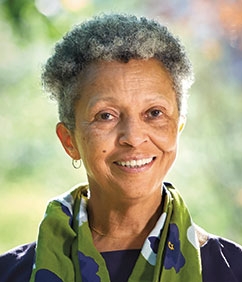Inaugural Elie Hirschfeld Symposium examines racism in the child welfare system
On January 24, leading experts on race, public interest, and family law issued a harsh critique of the current child welfare system, with a call for its abolition, in a panel discussion at the first-ever Elie Hirschfeld Symposium on Child Welfare. The symposium was named in honor of a recent gift by Elie Hirschfeld ’74, which also established a fellowship at the NYU Law Family Defense Clinic.
Panelists included Professors Khiara Bridges, associate dean for Equity, Justice, and Engagement at Boston University School of Law and author of Reproducing Race; Dorothy Roberts, founding director of the Program on Race, Science, and Society at the University of Pennsylvania; and NYU Law’s Peggy Cooper Davis, John S. R. Shad Professor of Lawyering and Ethics and former judge of the Family Court of the State of New York. The event was moderated by Chris Gottlieb ’97, co-director of the Family Defense Clinic, which co-sponsored the event with the Review of Law and Social Change.
The current child welfare system is based on a view of poverty as an ethical shortcoming, said Bridges, and it fails to acknowledge the systemic structures of poverty that impact black and brown communities. “The moral construction of poverty is the idea that people are poor because something is wrong with them,” said Bridges.
This perspective creates a child welfare system focused on addressing what it sees as individual moral failings through chaotic and emotionally tumultuous family separations, Bridges said. The result can impact entire communities, which are overwhelmingly poor and black.
State welfare agencies and social workers have also begun to use predictive analytics—which are based on large data sets of past offenders—to determine the likelihood that a person will commit certain crimes, including child abuse. The results of these analytics determine which referrals require investigation. But the data sets, Roberts says, are drawn from deeply racist data, and current structural inequality and human biases are built into these predictions.
“You can’t explain mass incarceration, the explosion of foster care, and the abolition of welfare without seeing how racism fueled all of these and how they have led to these disproportionate numbers of black people in the system,” Roberts said.
Cooper Davis compared the child welfare system to a kind of colonialism where, “you have an entity, a child welfare system, that assumes authority over and supervises and alters the terms of life in a community and in families that had thought of themselves as autonomous, and it does so…with a presumption of cultural and informational, if not biological, supremacy.”
When children are separated from their families, Bridges said, parents must often participate in anger management, vocational training, and other programming that is often irrelevant to the reason the family was separated.
In order to change the way that black and brown children and families are treated in the child welfare system, Cooper Davis called for legislation that more definitively protects constitutional human rights. “There is no explicit [constitutional] right of political representation, or education, or public accommodation, or bodily integrity, or family, or personal integrity. There is no explicit right of equal protection,” she said. The 14th Amendment, which was supposed to ensure equality for minority groups, is too vague and fails to be implemented in state-level institutions such as the child welfare system, she said.
The first step, the panelists agreed, was not reform, but abolishing the current system.
“The system itself was designed to be unjust, to control and police and punish and marginalize whole groups of people, and therefore, it’s not enough to reform it,” Roberts said. “What you have to do is abolish it in the sense that the entire philosophy of it, the entire structure, needs to end, and something different, something radically different needs to take its place.”
Posted February 20, 2019


